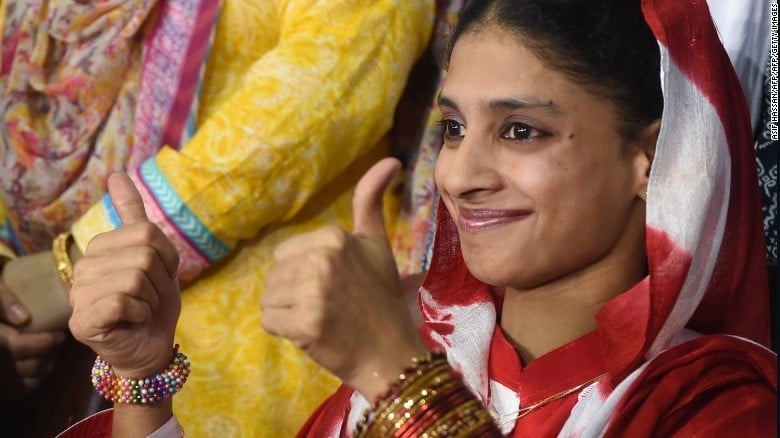
Those ‘daughters’ of the motherland that can wait…

When Geeta returned to India, she deservedly received a warm welcome. India’s colours and warmth celebrated her reunion with her homeland and loved ones. The whole spectacle was responsible for an unusual display of warmth on both sides of the border -- India’s External Affairs Minister praised Pakistan and its citizens for giving Geeta a home away from home.
Here in Pakistan, people seemed proud of how happy Geeta had been here. India’s daughter, as Geeta was referred to, was home and India’s neighbour had looked after her well during her separation. One anchor on an Indian news channel also went so far as to say, "We will have to accept that there are still some good people in Pakistan." When India and Pakistan start seeing each other as people, and good people no less, you know things are looking up.
But I digress. What troubled me while watching Geeta being welcomed in India was a reminder of how indifferently India and Pakistan treat their daughters most of the time. Being stuck in another country and then returning leads to a celebration -- along with proclamations that you are the motherland’s daughter. But those living within those borders and dealing with struggles of everyday life are treated by the state with complete disregard for their respect as women, security and welfare. This becomes particularly grave when women living in South Asia challenge the status quo -- built on the partnership between religion, patriarchy and nationalism. When women in our part of the world raise their voices to challenge how the state or its law deals with crimes of sexual aggression, they are dubbed anti-national and reminded how many rapes occur elsewhere. They are then blamed for wearing particular clothes or simply being in a public place in the first place.
I have not seen any rich male in either country being blamed for flaunting his wealth if he gets defrauded. No propertied male blames another male for having too much money when one of them is robbed. This is not meant to suggest at all that male victims of crimes should be blamed -- but to underscore that blaming women for crimes against them is unjust and repulsive. And hence there is a gross disparity between the state’s marketing and its reality when it comes to treatment of women.
Both Pakistan and India have a history of banning speech of women or ostracising them through mud-slinging when they raise difficult issues. Both celebrate women when convenient and when it does not take the state out of its comfort zone. This is not schizophrenic -- this is downright disingenuous, deliberate and an insult to women as well as anyone who cares about human dignity.
Malala Yousafzai is a classic example of Pakistan’s confusion on this issue. The incredibly brave individual that she is, the amount of unadulterated hate thrown her way when she brings to light Pakistan’s issues of extremism and patriarchy’s marriage with religion is no secret. Her own cause is then attacked and she is berated by vocal sections of the public (not a minority by any means) for not saying enough about collateral damage in drone strikes. If tomorrow Malala questions our establishment (political and military) for the way we deal with the problem of terrorism, very few would want a photo-op with her. The same is true if she were to make reform of rape related trials her cause.
Similarly, social activists in India are kosher for celebration when they criticise those that the state wants criticised -- but criticism of patriarchy or religion is a guarantee of being gagged or pushed to the margins. Hence, it is not womanhood or individuality of a woman that we celebrate but her conformity with our ideal of what is safe to celebrate. If tomorrow Geeta becomes a public personality taking on causes that make Modi, the state of India, as well as the underlying patriarchy, uncomfortable then Geeta is in for a completely different ride. Her womanhood, which today is being celebrated, will become a disqualification.
Empowerment of women and celebrating womanhood is then not an aim in itself -- it is a conditional license granted to those who fit the bill. But in ways that even women may not realise, because the state and not women get to make the final call on this, the same empowered women will be treated as villains since they cross a line.
Gestures like Modi’s donation of INR 1 crore to Edhi Foundation (a donation which may well be refused) are another example of how hollow the public posturing surrounding women is. Modi would never be so generous at spending money or effort to help women who daily face discrimination, sexual harassment or sexual abuse. That is not as glamorous and those ‘daughters’ of the motherland can wait.
Therefore, while we celebrate the wonders of human spirit that resulted in a story like Geeta, let us remember that there are millions of Geetas who may not make the news but deserve the same respect and admiration. Perhaps more importantly, these invisible women of the sub-continent deserve empowerment because they are human and not just because they buy into narratives perpetrated by patriarchal states drunk on religion and nationalism.
The article was published in The News on Sunday on November 1, 2015 with the title Wonder of human spirit.